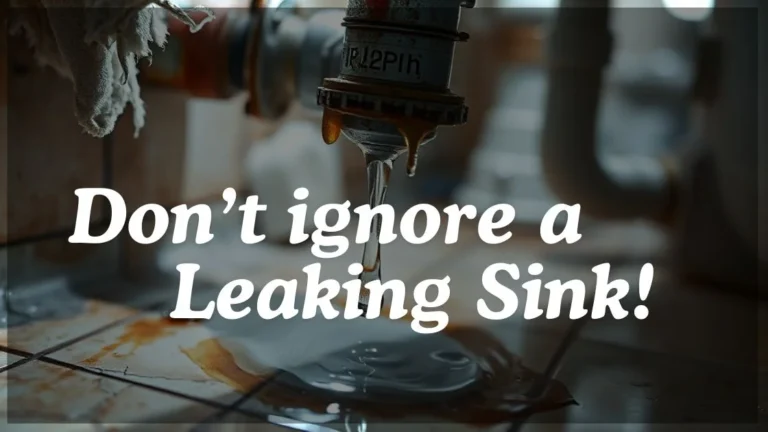Ignoring a leaking sink can result in significant dangers for homeowners. Over time, even minor leaks may cause extensive structural damage, as they weaken essential materials such as timber and plasterboard.
Stagnant water fosters mould growth, posing serious health risks like respiratory issues and allergic reactions. Increased utility costs from wasted water further exacerbate financial burdens, while wear on plumbing fixtures leads to premature replacements.
Unpleasant odours signal deeper problems that often require professional intervention. Addressing leaks promptly not only preserves the integrity of the home but also enhances the overall living environment.
Investigate further to uncover practical solutions and preventative measures.
Home Damage Risks
Even a seemingly minor leak from a sink can lead to extensive home damage risks that are often underestimated. The persistent presence of water can significantly damage floors and walls, necessitating costly repairs or replacements of materials such as insulation and plasterboard.
Ignoring a leak may result in wood rot, compromising structural integrity and increasing repair expenses. Regular plumbing inspections are essential to identify and address these issues before they escalate. Check out these common causes of sink leaks.
Incorporating comprehensive maintenance routines can help homeowners mitigate risks, ensuring their living spaces remain safe and sound. By prioritising these preventive measures, you not only protect your home but also foster a sense of belonging within a secure environment, free from the hidden dangers of neglect.
Mould Formation Concerns
A leaking sink creates a perfect breeding ground for mould, allowing it to proliferate rapidly in damp environments.
This not only poses significant health risks—such as respiratory issues and allergic reactions—but also threatens the structural integrity of your home.
Timely intervention is essential to mitigate these dangers and prevent costly repairs from extensive mould damage.
Rapid Mould Growth
How quickly can a seemingly minor leak escalate into a serious mould problem? In just 24 to 48 hours, uncontrolled water from a leaking sink can create an ideal environment for rapid mould growth.
Prolonged exposure may lead to the development of stachybotrys chartarum, commonly known as black mould, which poses significant risks to your home and your health.
Mould not only compromises wooden structures and plasterboard but also necessitates costly mould removal and repairs.
Effective moisture control is essential to prevent extensive property damage and safeguard your living space.
Ignoring a leak can exacerbate these issues, making it imperative for homeowners to address leaks promptly and mitigate the potential for mould proliferation.
Your home deserves the best care.
Health Risks Involved
Three critical health risks arise from prolonged exposure to mould, particularly Stachybotrys chartarum, commonly known as black mould.
Initially, individuals may experience respiratory issues, including persistent coughs and wheezing, which can escalate into severe conditions if left unaddressed. Such symptoms often manifest as a result of deteriorating indoor air quality in spaces with leaking sinks.
Furthermore, allergic reactions can occur, with symptoms ranging from skin irritation to more serious responses, affecting those with pre-existing sensitivities.
Finally, prolonged mould exposure can lead to chronic health complications, particularly for vulnerable populations, such as children and individuals with asthma.
Addressing leaks promptly not only safeguards your home but also protects the health and well-being of those who inhabit it.
Related: The Risks of Ignoring Water Leaks In Your Home.
Structural Damage Implications
The dangers of structural damage resulting from a leaking sink extend far beyond mere inconvenience; they pose significant threats to the integrity of a home.
Persistent water infiltration can lead to material weakness in key components such as wood and plasterboard, compromising the structural soundness of your living space.
As moisture accumulates, the risk of mould formation escalates, particularly the growth of stachybotrys chartarum, commonly known as black mould.
This not only jeopardises safety but also increases repair costs, as affected materials may require complete replacement.
Early intervention is vital; otherwise, the long-term implications of ignoring a simple leak can culminate in a costly and hazardous situation, impacting both your home and health.
Fixture Wear and Tear
A leaking sink poses significant risks to the longevity of fixtures, as continuous water flow can accelerate wear and lead to premature failures.
This constant demand not only heightens utility costs but also increases the risk of damaging nearby appliances and plumbing systems.
Addressing leaks promptly is essential to mitigate these impacts and maintain the integrity of your home’s plumbing infrastructure.
Impact on Fixture Longevity
How does a seemingly minor leak in a sink translate into significant wear and tear on plumbing fixtures? Continuous dripping can lead to excessive strain on taps and other components, eventually shortening their lifespan.
Neglecting leak detection not only accelerates the deterioration of these fixtures but can also result in costly premature replacements. Regular tap maintenance becomes crucial to mitigate this risk.
Over time, a leaking sink can force hot water tanks to operate inefficiently, leading to increasing maintenance costs and unnecessary repairs. Addressing leaks swiftly is essential; even minor drips can snowball into major issues.
Increased Utility Costs
Neglecting the implications of a leaking sink can lead not only to fixture deterioration but also to a significant rise in utility costs.
A dripping tap, for instance, can waste approximately 14,500 litres of water annually, driving up your water bill and hindering effective water conservation efforts.
Additionally, leaks can prompt hot water tanks to refill more frequently, resulting in increased energy consumption and higher electricity expenses.
Dishwashers may also operate inefficiently under such conditions, leading to costly repairs and replacements.
By addressing leaks promptly, homeowners can save an estimated 10% on water bills, ensuring better budget management.
Prioritising timely repairs not only conserves resources but also fosters a sense of community responsibility, encouraging a more sustainable lifestyle for all.
Risk of Appliance Damage
Even a minor leak can have significant consequences for household appliances and plumbing fixtures. Continuous water flow not only accelerates wear and tear on taps and pipes but also diminishes appliance efficiency.
For instance, a leaking dishwasher may struggle to operate properly, risking damage to its internal components and leading to unexpected repair costs. Additionally, hot water tanks face increased operational demands, resulting in higher energy bills as they work to maintain adequate water levels.
Ignoring such leaks can escalate into major plumbing issues, eventually necessitating costly fixture replacements. By prioritising regular maintenance and prompt repairs, homeowners can safeguard their appliances, ensuring longevity and efficiency while minimising future repair expenses.
Taking action today can save you money tomorrow.
Unpleasant Odours
Experiencing unpleasant odours from a leaking sink can be both distressing and indicative of deeper issues within the home. Persistent leaks often lead to musty and rotten smells that can permeate living spaces, making them uncomfortable.
Excess moisture complicates odour removal, allowing scents to seep into walls, textiles, and belongings. Additionally, the damp conditions foster mould and mildew, which exacerbate these odours.
Timely leak repairs are essential for effective moisture control, limiting exposure that encourages odour-causing bacteria and mould growth. Once repairs are completed, professional cleaning may be necessary to fully eliminate stubborn odours that linger.
Addressing these issues promptly not only enhances your living environment but also promotes a healthier home, fostering a sense of belonging and comfort.
Importance of Professional Help
Persistent odours from a leaking sink often signal underlying issues that require immediate attention.
Relying on professional help is vital for comprehensive plumbing solutions. Engaging experts not only guarantees a thorough assessment but also effectively addresses potential hazards.
- Thorough Evaluation: Professionals inspect for structural damage and mould growth.
- Advanced Techniques: Local plumbers employ specialised tools for precise leak detection, even in hidden areas.
- Cost Savings: Early intervention prevents minor issues from escalating into significant repair costs.
Preventative Measures to Consider
Regular preventative measures are essential in safeguarding your home from the hidden dangers associated with a leaking sink. Conducting routine inspections of plumbing fixtures can help identify leaks early, ultimately saving you from extensive damage and costly repairs.
Addressing minor leaks, such as dripping taps, can lead to significant savings—up to 10% on your water bills. Moreover, installing advanced leak detection systems provides an invaluable layer of protection, alerting you to issues before they escalate.
Educating family members about the importance of promptly reporting leaks fosters a proactive maintenance culture. Scheduling annual plumbing maintenance ensures all systems function efficiently, further reducing leak risks.
Implementing these water-saving tips not only protects your home but also enhances your sense of community responsibility.
Key Takeaways
- Ignoring a leaking sink can lead to extensive water damage, compromising floors, walls, and the overall structural integrity of your home.
- Persistent leaks create ideal conditions for mould growth, posing serious health risks such as respiratory issues and allergic reactions.
- Continuous water waste from a leak can significantly increase utility bills and lead to premature wear on plumbing fixtures and appliances.
- Unpleasant odours from damp environments indicate deeper issues that require professional intervention to ensure a healthy living space.
- Timely repairs can prevent minor leaks from escalating into major problems, ultimately saving homeowners money and safeguarding their property.
Is that small drip from your sink more than just an annoyance?
Ignoring a leaking sink can lead to serious consequences, affecting both your home and your health!
Don’t let a minor drip become a major disaster. Contact PCLA today to find out how we can help fix your leaking sink with minimal hassle.



